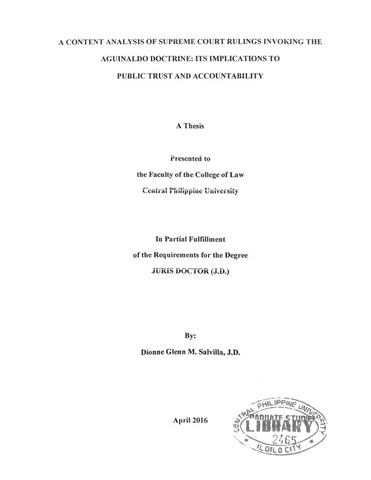A content analysis of Supreme Court rulings invoking the Aguinaldo Doctrine: Its implications to public trust and accountability
| dc.contributor.adviser | Alibogha, Salex E. | |
| dc.contributor.author | Salvilla, Dionne Glenn M. | |
| dc.date.accessioned | 2021-02-12T08:25:54Z | |
| dc.date.available | 2021-02-12T08:25:54Z | |
| dc.date.issued | 2016 | |
| dc.identifier.citation | Salvilla, D. G. M. (2016). A content analysis of Supreme Court rulings invoking the Aguinaldo Doctrine: Its implications to public trust and accountability (Unpublished postgraduate thesis). Central Philippine University, Jaro, Iloilo City. | en_US |
| dc.identifier.uri | https://hdl.handle.net/20.500.12852/345 | |
| dc.description | Abstract only | en_US |
| dc.description.abstract | The purpose of this study was to look into the cases wherein the Doctrine of Aguinaldo was first revived during the 1987 Constitution and the rationale for its revival. The study also looked into the various Supreme Court decisions wherein the doctrine was continuously upheld, as well as the modifications, limitations, and expansions the doctrine has been given as rationalized by the Supreme Court. This study also examined Supreme Court decisions on cases wherein the doctrine was invoked by the public officer involved in the case. Using information from legal sources, official publications, and related studies, the data gathered were analyzed in order to determine the public officer who may properly invoke the doctrine, the nature of the case wherein the doctrine is applicable, and the rationale as to why the doctrine was given application or rejected. The study found out that only elective officials or officials who are vested public office by popular election, re-elected in the same position may invoke the doctrine. In the event that the public officer is re-elected into office, such re-election operates as a condonation to all misconduct committed during the previous term of office. The doctrine is only applicable to administrative cases and not criminal cases. The rationale is that reelection has the effect of voters forgiving the public official’s faults or misconduct, thus, re-election extinguishes the administrative liability of the public officer. The doctrine, however, was refused in application and was abandoned by the Supreme Court in the case of Carpio-Morales vs CA and Binay, Jr. since it has no legal basis in the Constitution. | en_US |
| dc.format.extent | ii, 46 leaves | en_US |
| dc.language.iso | en | en_US |
| dc.subject.ddc | GSL Theses 340.72 Sa39 | en_US |
| dc.subject.lcsh | Public officers | en_US |
| dc.subject.lcsh | Misconduct in office | en_US |
| dc.title | A content analysis of Supreme Court rulings invoking the Aguinaldo Doctrine: Its implications to public trust and accountability | en_US |
| dc.type | Thesis | en_US |
| dc.description.bibliographicalreferences | Includes bibliographical references | en_US |
| dc.contributor.department | College of Law | en_US |
| dc.description.degree | Juris Doctor | en_US |
| local.subject | Aguinaldo doctrine | en_US |
| local.subject | Administrative cases | en_US |
| local.subject | Supreme court decisions | en_US |
| local.subject | Condonation of misconduct | en_US |
| local.subject | Public officials | en_US |
Files in this item
This item appears in the following Collection(s)
-
Juris Doctor [144]


